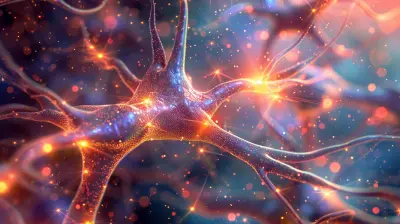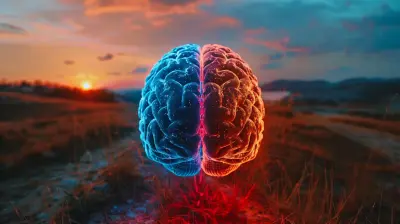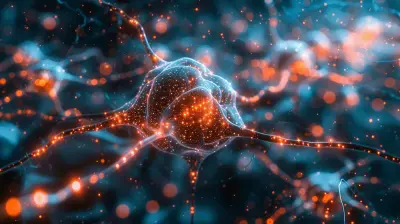Thank you for shedding light on synaptic pruning! It’s fascinating how our brains efficiently streamline information, highlighting the incredible adaptability of our neural connections.
Author: Gwen Cummings

Janet Conrad
Thank you for your thoughtful comment! I'm glad you found the topic of synaptic pruning fascinating. It truly showcases the brain's remarkable adaptability!
Great insights! Empathy truly transforms conflict into understanding and connection.
Author: Finley James
Thank you for this insightful article! I appreciate how you highlighted the connection between mindfulness and improved focus. I’ve been struggling with distractions lately, and your practical tips inspire me to integrate mindfulness into my routine. Looking forward to trying these techniques!
Author: Aiden Franklin

Janet Conrad
Thank you for your kind words! I'm glad you found the article helpful. Best of luck with integrating mindfulness into your routine—it's a powerful tool for enhancing focus!
This article insightfully highlights the transformative power of mindful self-compassion in fostering inner healing. By integrating mindfulness with self-kindness, individuals can break cycles of negative self-talk, ultimately nurturing resilience and emotional well-being. A valuable perspective for anyone on a healing journey.
Author: Rook Barron

Janet Conrad
Thank you for your thoughtful comment! I'm glad you found the exploration of mindful self-compassion valuable for healing.
This article on self-compassion in therapy piques my curiosity! How does cultivating self-love influence our healing process? I’m eager to explore the science behind this transformative approach!
Author: Zane Wright

Janet Conrad
Cultivating self-love fosters a positive mindset, enhances resilience, and reduces self-criticism, all of which are vital for effective healing. Research shows that self-compassion can lead to greater emotional regulation and overall well-being, making it a powerful tool in therapy.
Mindfulness cultivates a profound awareness, transforming distractions into opportunities for clarity. By embracing the present, we not only enhance focus but also unlock our true potential.
Author: Zayn Powell
Love languages truly enhance relationship fulfillment.
Author: Zayn McKellar

Janet Conrad
Thank you! Understanding and speaking each other’s love languages can indeed deepen emotional connections and greatly enhance relationship satisfaction.
This article sheds crucial light on the lasting effects of childhood trauma. Understanding its connection to PTSD can empower us to support healing and resilience. Thank you for sharing such important insights to help those in need!
Author: Sylvan Barlow

Janet Conrad
Thank you for your thoughtful comment! I'm glad you found the insights valuable for supporting healing and resilience.
Such an insightful read! It’s fascinating how our personalities influence our conflict resolution styles. Understanding this can truly enhance our relationships and communication skills!
Author: Calyx McMeekin
Fascinating! I'm eager to learn how bilingualism reshapes cognitive functions and neural connections.
Author: Chelsea Wolf

Janet Conrad
Thank you! Bilingualism indeed enhances cognitive flexibility and may strengthen neural pathways, leading to improved problem-solving and multitasking abilities. Excited to share more insights!
Insightful read; truly resonates deeply.
Author: Loretta Frank
What a fascinating dive into the world of mental imagery! It's incredible how our minds can paint vibrant pictures without sight. Embracing this skill can spark creativity and enhance our problem-solving abilities. Remember, every great idea starts as an image in the mind—so keep visualizing and let your imagination soar! 🌟
Author: Nancy Castillo

Janet Conrad
Thank you! I'm glad you found it fascinating. Indeed, mental imagery plays a crucial role in creativity and problem-solving. Let's continue to explore and unleash our imaginations! 🌟
Embracing mindful self-compassion is like giving your inner critic a warm hug and a cookie! Instead of berating ourselves for imperfections, let’s sprinkle some kindness and understanding into our mental toolkit. After all, healing is a team sport—and self-love is the MVP!
Author: Brick Wright
Intriguing insights on healing through mind-body integration!
Author: Taylor Nelson

Janet Conrad
Thank you! I'm glad you found the insights on mind-body integration intriguing.
Rest fuels resilience; balance is key to toughness.
Author: Sabina McCaw

Janet Conrad
Absolutely! Rest is essential for building mental resilience and maintaining balance. Thank you for your insightful comment!
Empathy: the secret sauce for settling disputes! Just sprinkle some understanding, stir in kindness, and voilà—issues tackled like magic!
Author: Selkie Elliott

Janet Conrad
Absolutely! Empathy transforms conflict resolution by fostering understanding and compassion, making it a powerful tool for peaceful solutions.
Fascinating insights! How does mindfulness reshape thoughts?
Author: Sarina Lynch
Understanding synaptic pruning highlights how our brains efficiently manage and prioritize information.
Author: Berenice Moses

Janet Conrad
Absolutely! Synaptic pruning is a crucial process that helps the brain eliminate excess connections, optimizing our neural networks for better information management and efficiency.
Curiosity truly strengthens resilience; keep exploring life!
Author: Ardent McKay



















